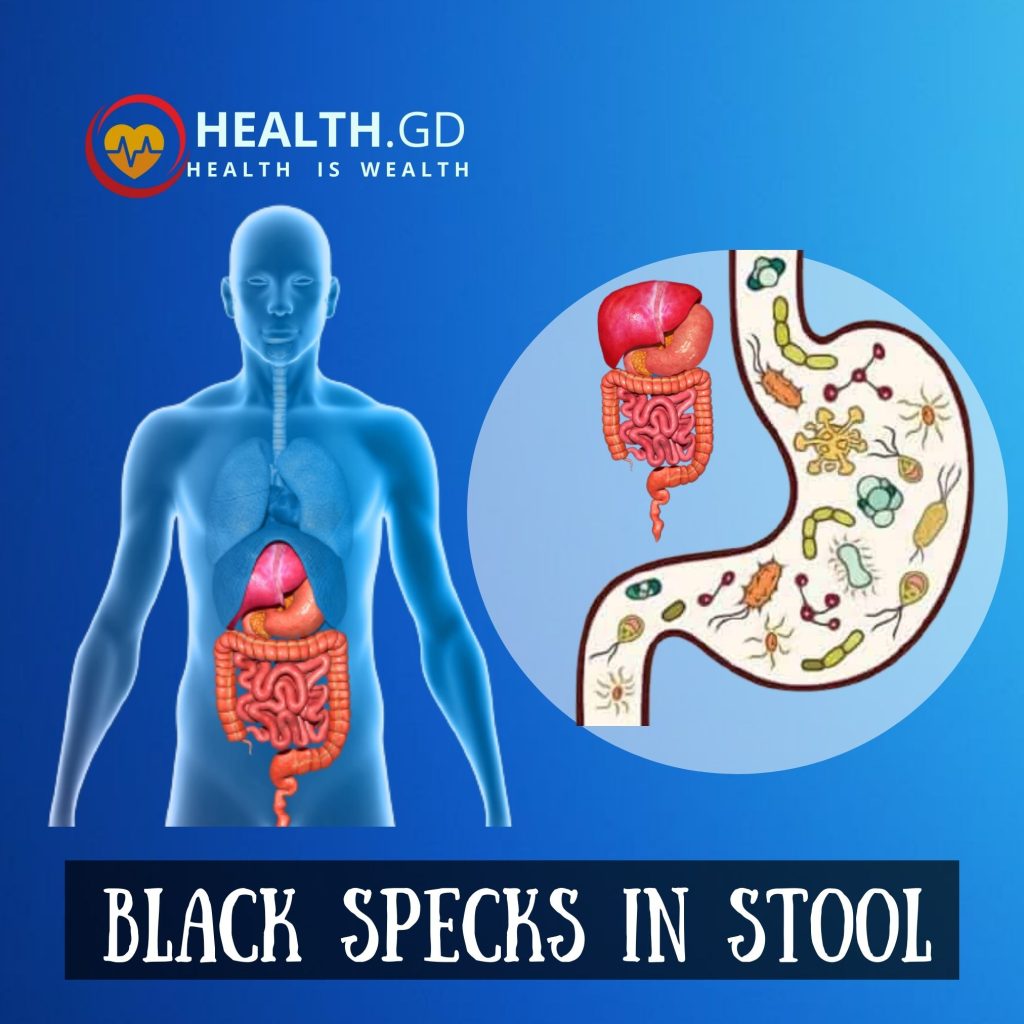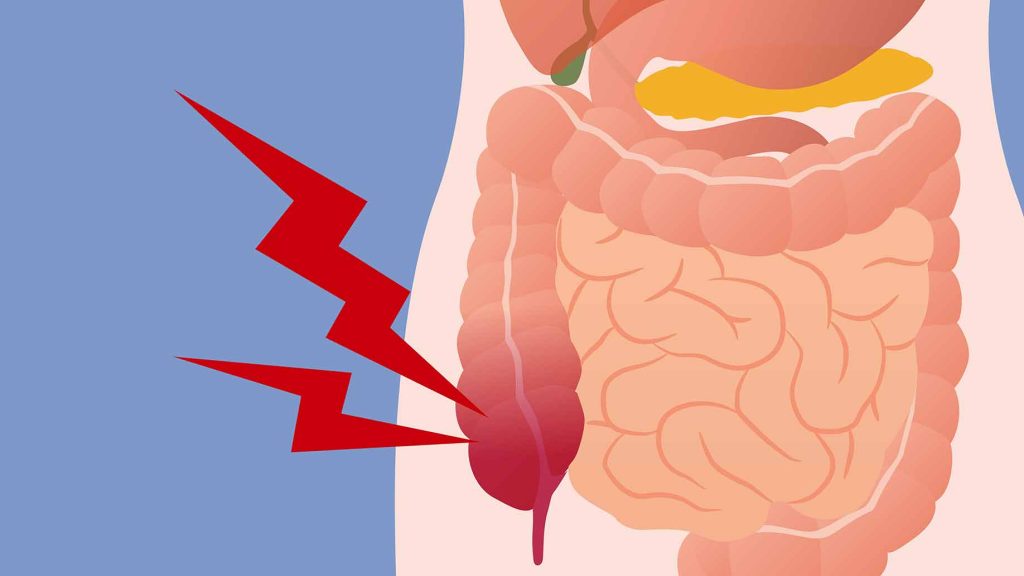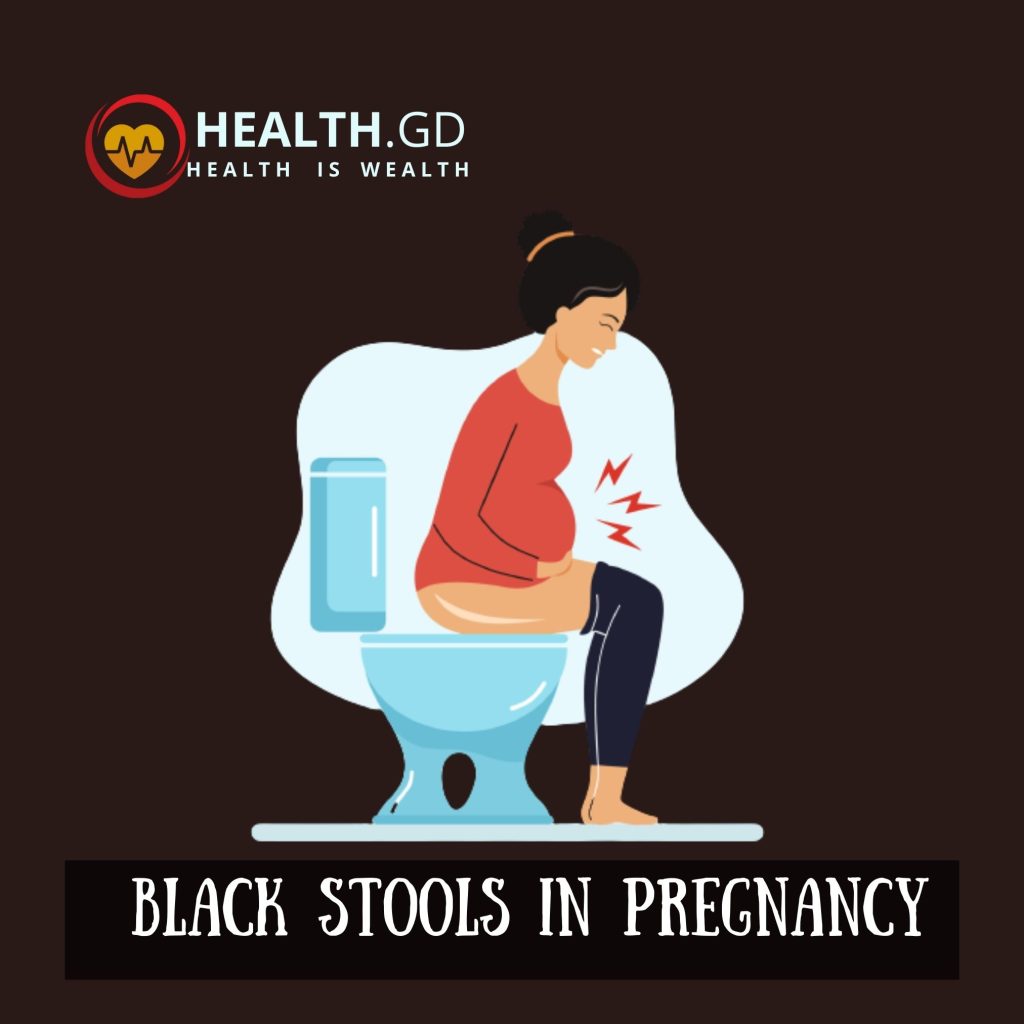The presence of black specks in stool determines a very dark color tending to black (we are therefore talking about black stools). It is the blood that comes from the upper part of the gastrointestinal tract from the esophagus, stomach, and intestines.

The feces that derive from this site secrete a very acid odor and the phenomenon is called melena. ” False melena ” is a stool that is dark or black but does not actually contain blood (blood in the stool).
Losing blood from an area of the body that is part of the upper gastrointestinal tract is not a good sign and a sudden visit to the doctor is recommended, who will be able to prescribe the right tests to do.
What Foods Need To Avoid For Ovarian Cysts
Ovarian cysts are very common in women, and in most cases, their nature is not dangerous. Here we discuss the list of foods to avoid with ovarian cysts.
Symptoms associated with black stools
The symptoms that accompany black stools vary, therefore, depending on the root cause. These include:
- Abdominal pain
- Abdominal swelling
- Change in bowel habits
- Diarrhea
- Indigestion
- Flu-like symptoms
- I smelled bad
- Nausea and vomiting
- Poor appetite
- Rectal pain or a burning sensation
- Sudden weight loss.
What Causes Black Specks In Stool
The causes of black stools are different, such as ingesting certain substances or taking iron supplements.

However, it can also be caused by a serious condition – bleeding in the digestive tract due to a peptic ulcer.
Among the causes black specks in stool stand out:
- Stomach ulcer (peptic ulcer)
- Inflammation of the gastrointestinal tract
- Use of non-steroidal anti-inflammatory drugs (NSAIDs).
Black stools may be a habit for people who have had a colectomy because food is not digested as completely.
However, if you have had gastrointestinal bleeding in the past, you may find foul-smelling stools or the problem goes on for more than a couple of days, it is good to see your doctor immediately.
Other Causes of Black Specks In Stool:
- An ulcer that bleeds – An ulcer is a wound that appears on the stomach lining that can cause bleeding and melena. Contrary to popular belief, stomach ulcers are not usually caused by stress or spicy food (although these can aggravate an existing ulcer). In fact, they are caused by an infection with a bacterium called Helicobacter pylori (H. pylori). Antibiotics are normally prescribed to clear the infection and sometimes an acid reducer. Another cause of stomach ulcers is the long-term use of pain relievers, known as NSAIDs (non-steroidal anti-inflammatory drugs). NSAIDs can irritate the stomach, weakening the ability of the lining to resist the acid produced in the organ itself. For this same reason, NSAIDs have a negative effect on Crohn’s disease and ulcerative colitis. NSAIDs are common drugs such as ibuprofen, naproxen sodium, and aspirin.
- Gastritis – Gastritis is inflammation of the stomach lining; it can be caused by too much alcohol, spicy food, smoking, bacterial infection, or prolonged use of NSAIDs. Gastritis can also develop after surgery or trauma, or it can be associated with pre-existing medical conditions.
- Esophageal varices – Esophageal varices are dilated veins in the stomach wall, upper or lower esophagus. When these veins rupture, they can cause bleeding, which can cause blood to appear in stool or vomit. Esophageal varices are a serious complication of portal hypertension ( high blood pressure ) caused by liver cirrhosis.
Easiest Ways To Grow Eyelashes Overnight
Foods that cause black specks in stool
Foods that cause black stools include:
- Broccoli, spinach, rocket, parsley, green beans: these are vegetables rich in chlorophyll, which colors the stools green (green stools).
- Beets, blueberries, cherries: rich in beta carotene, which gives it its color, they give the stool a reddish color.
- Red wine: Red can change the color of the stool (dark brown stool).
- Non-steroidal anti-inflammatory drugs: These can be due to a change in fecal color.
- Licorice: especially if consumed in excess, it darkens the excrements (feces piece).
- Black worms and parasites are very common, especially among children (dark green stools).
Tests to do for dark stools
The diagnosis of disorders related to black stool is usually made by the doctor through a symptom picture.
The black color alone is not sufficient to determine the presence of blood. Therefore, a doctor will need to confirm whether there is actually no blood in the stool.
This can be done in a doctor’s office through a rectal exam or, it can be done at home with a kit that is used to collect a small stool sample, which will then be sent to a laboratory for evaluation.
Once the diagnosis of melaena is made, the doctor may order other diagnostic tests to determine the cause and exact location of the bleeding. These tests can include:
- Radiography
- Blood tests
- Colonoscopy
- Gastroscopy
- Stool culture
- Studies of barium
What to do in case of dark stools
This is a situation that requires quick action. The treatment for black stool varies according to the causes that generated the problem, so it can be pharmacological, surgical, or other, depending on the case.
For this, diagnostic tests and a morphological evaluation of the stool itself are very important, namely:
- Consistency
- Color
- Quantity
- Odor
For example, if your stool is streaked with black, it could just be a residue of plant fibers.
Colon cancer and black stools
Black stools can indicate continuous bleeding from the rectum, which can also be a symptom of colon cancer.

In these cases, it is good to consult a doctor who will understand if you also experience other symptoms, such as diarrhea or constipation. There may be ulcerative lesions or inflammatory bowel erosions.
Black stools in pregnancy
Changes in stool color in pregnancy mainly occur as a result of taking certain medications, supplements, or intestinal bleeding.
To diagnose the condition, your doctor will study your medical history, dietary changes, and the full list of medications you are taking.
After the physical inspection, the laboratory will examine the stool for the presence of blood, fat, or infections. During pregnancy, stools appear black due to iron and vitamin supplements. As the uterus enlarges, the increased pressure within the pelvis can cause constipation and hemorrhoids, which often leads to internal bleeding and the stools appear dark.

Along with dark stools, if you experience other symptoms such as abdominal pain, nausea, diarrhea, or fever, seek immediate medical attention.
Pregnancy involves numerous changes in health conditions, including digestive functioning and the consistency of stool.
Stools may become dark, black, greenish, or dark red. The pregnant woman is more likely to experience several health complications, and dark, smelly stools are one of them.
Here are some factors that increase the likelihood of black, foul-smelling stools :
1
Iron Supplements
These are given if the woman has a high risk of suffering from anemia or a low red blood cell count during pregnancy. The gynecologist prescribes iron supplements to increase the blood supply. The body cannot absorb some of the typical forms of iron, including ferrous sulfate and ferrous gluconate. Since the body is unable to do this, it makes the stool dark. To avoid this, you need to eat iron-rich foods, such as green leafy vegetables, red meat, and liver.
2
Medications
Some medications can darken stools during pregnancy. A drug prescribed for stomach ailments often causes this symptom. For these reasons, before taking any new medication during pregnancy, consult your gynecologist.
3
Foods
Dark stools often result from consuming certain foods during pregnancy, such as blueberries and licorice. The presence of artificial food coloring in some preparations can also affect the color of the stool.
4
Bleeding
Occurs in the upper gastrointestinal tract such as the intestines, stomach, or esophagus; can cause a change in stool color. When the excreted blood mixes with the digestive juices, it becomes tar-like or black and makes the stool dark in color. Melena is the condition in which dark, tarry, and smelly stools occur, due to intestinal bleeding. Some of the main causes of gastrointestinal tract bleeding include gastritis, duodenal ulcer (bleeding stomach), lack of adequate blood supply to the intestine, and ulceration of the esophagus caused by violent vomiting.
5
Health Disorders
The chances of suffering from digestive disorders such as constipation, hemorrhoids, and anal fissures are higher during pregnancy. A lower intake of water and fibrous foods and high potency of prenatal vitamins often leads to such digestive disorders in gestation. When the blood vessels around the rectal region swell painfully during the last trimester, there is difficulty in passing stool. Swollen hemorrhoids start bleeding and cause black specks in stool to be present. The fissures around the delicate skin of the rectum and the excess tension to pass the hardened stools cause this condition. When these fissures start to crack, a small amount of blood is expelled along with the poop, which will appear darker.
To avoid the presence of black stools during pregnancy, here are some tips that you can follow:
- Eating a high-fiber diet – reduces the risk of gastrointestinal bleeding, constipation, and hemorrhoids during pregnancy. Unprocessed wheat bran can also be added.
- Drink lots of water – During pregnancy, you need to take 8 to 12 glasses of water every day, which makes the stool softer. Alternatively, you can also include fresh fruit juices and other healthy drinks in your daily diet.
- Take Fiber Supplements – Instead of taking high doses of iron supplements that darken stools, you can take iron naturally in the form of fresh fruit and green leafy vegetables.
- Avoid certain medications – Avoid prolonged and excessive use of anti-inflammatory drugs such as aspirin, ibuprofen, and naproxen during pregnancy, as it elevates the risk of dark stools. Before taking any new over-the-counter medications during pregnancy, check with your doctor.
- Avoid smoking or taking drugs – During pregnancy, you need to limit your alcohol intake. Excessive consumption of alcohol or illicit drugs irritates the lining of the esophagus and stomach and black specks in stool. Smoking increases the risk of peptic ulcers and tumors of the gastrointestinal tract.
- Gymnastics – Lightweight exercises such as yoga, aerobics, and pilates can be enjoyed during pregnancy. Exercise regulates bowel movements and helps overcome constipation and hemorrhoids. Kegel exercises can be included, as they tighten the muscles around the rectum and vagina and help prepare for childbirth.
Do You Know, Yoga Poses Can Reduce Depression?
Read how this 10 minutes yoga can help you reduce your depression, brighten up your mental and physical health at the same time.
Healthy stools
Thus, many things can be understood from feces. For this reason, here is a description of how healthy stools should be :
- Stool size – Ideal diameter of 2-5cm.
- Stool length – About 30cm.
- Odor – Beware of overly smelly stools.
- Stool consistency – They should be soft, but not too soft, non-floating, and free of mucus.
Natural remedies for melena
Any abnormalities in the color, texture, and odor of poop should be reported to a doctor. There are no home remedies for dark-colored stools caused by internal bleeding or other reasons.
Home remedies for black stools are intended solely for those caused by diet. Unless you are sure that the cause of the dark-colored poop is what you eat, then you can change your diet. For these reasons, dark-colored stools are normal.
It is important to remember that stool of this color is a symptom, not a disease.
Reference:
| Name | Website URL |
| Wikipedia | CLICK HERE TO VISIT |








